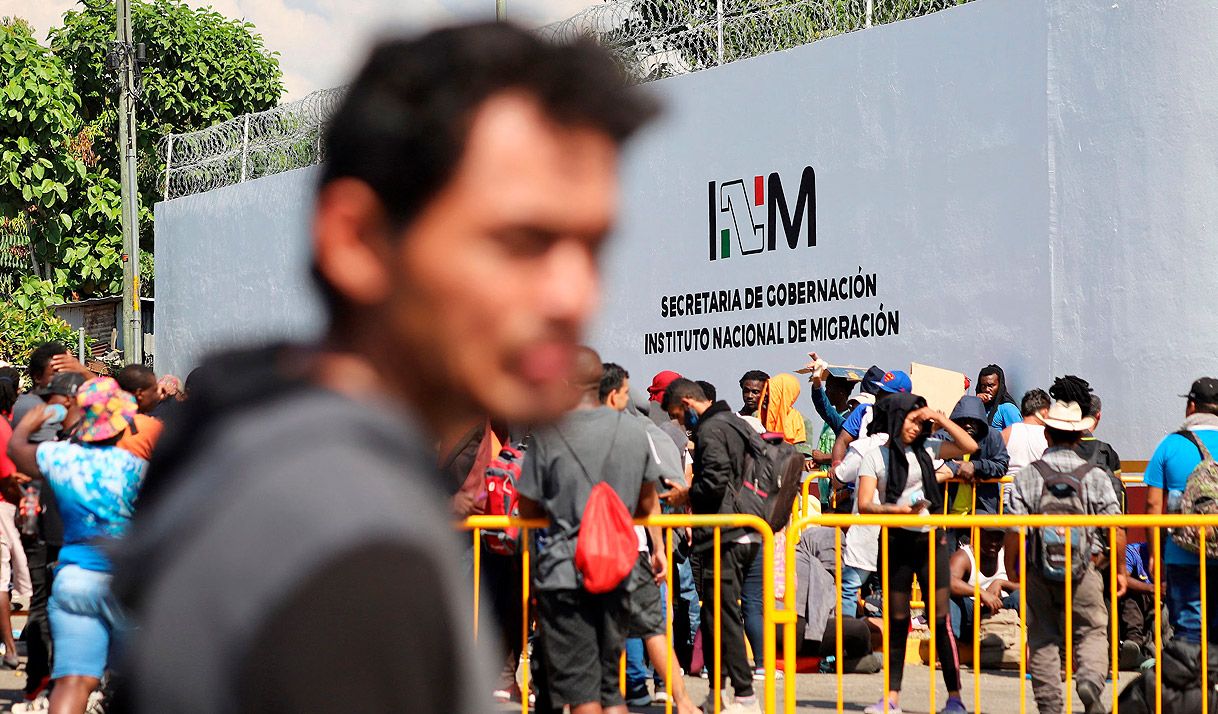
Photo: Jacob García / Reuters.
Surviving Tapachula: Witness Account of a Cuban Migrant
3 / octubre / 2023
It was raining terribly in Holguin when the plane took off. Was the country weeping? Was it a sign? But for someone who got onboard with a small backpack and put it under their seat, then tightly closed the belt that stands out of its place, next to the window or aisle, there is no return.
It doesn’t matter how much the flight cost, $1,400 USD, and it doesn’t matter how much further is left to land in Managua, the turbulence, uncertainty; nor the journey that is to follow. Honduras, Guatemala, crossing the Suchiate River and disembarking in Chiapas. It doesn’t matter that you’re entering each of these countries illegally when risking what you don’t have is the only thing you have left. Tapachula doesn’t matter, almost at the foot of the Tacana Volcano, chile, tacos with beans, regularization papers, work, waiting and, once again, uncertainty. Who leaves a country without knowing for sure that they will reach the destination they seek?
When the plane took off in Holguin, Leo* knew that it was Sunday, August 23, 2023, that he was afraid, that all of this made him really upset and that fleeing the country, going far from his country, was the only thing he could think about. However, he didn’t know how long his journey would take, nor how long it would take him to reach the US. He still doesn’t. He knows he’s been in the State of Chiapas for a month, which used to be Maya territory, but is now an open-air booby trap for migrants.
He reached Managua in the early morning, after a stop-over in the Dominican Republic. He’d taken a car the following night. He says it was safe, that everything was very well organized, but the journey was long and “practically exhausting.” He met other Cubans along the way, they traveled in large groups, some were couples, others had young children. A year ago, approximately 300,000 Cubans also passed through here, taking similar routes. Now, a potentially hostile route, with a lot less safeguards, is being revived.
There were stretches when Leo had to walk through the jungle until he reached some buses where he joined other Cubans. They passed through Tegucipalpa. They saw the city lights at night from afar. They stopped in certain spots to go to the bathroom and to buy food. They arrived in Guatemala in the day and stayed 24 hours in a motel. They were given food, rested, recovered their strength to be able to reach the Suchiate river shore at night. Once in Mexico, they took taxis to their rental homes and lodgings that everyone had already booked.
Arriving and waiting in Tapachula, Chiapas, Mexico
Living together in precarious conditions, in a faraway land with people you’ve just met, is hard. Rents have gone up a lot in Tapachula, as has the price of food and services. The first thing Cubans do, which Leo also did, once on Mexican soil, is to go to the Mexican Commission for Refugee Assistance (COMAR). There, they are given a letter of safe-passage to be able to move around Tapachula without the danger of being arrested or deported.
The line – which is called the fila in Mexico -, was quite long when he arrived, but it would get even more “chaotic” days later. He went into a place with different offices, he was given a ticket that he filled out with his personal information – address in Cuba, email, etc. – before heading towards another cubicle where he had to show his passport to a person sitting behind a computer. They only asked a few questions and he was sent to another place. That’s where he was finally given his letter of safe-passage. While Leo was moving along this process, he kept seeing Cubans and Haitians, above all else. Leo says that he doesn’t consider himself an economic migrant. He fled the island because he had problems with State Security and he told this to another officer who was taking anonymous surveys at COMAR with Cubans about their reasons for leaving the country.
Staying in Tapachula and the Central American route beginning in Nicaragua are due to many Cubans preferring to wait out their parole processes or apply for a CBP One appointment on Mexican soil. Leo has seen people who come and are on a flight to the US in four or five days, but others spend months in Tapachula. “The atmosphere among Cubans here is of high hopes, but also unease. There is an atmosphere of uncertainty that continues to grow.”
There have been riots, there have been clashes between Cubans and Haitians, the police have intervened and stopped Cubans with some kind of authorization to go to the US southern border from flying across, since mid-September. The request for authorization to fly used to be processed at Mexico’s National Migration Institute (INM). Leo was at a protest of migrants who protested for the measure. They spent most of the day sitting on the sidewalk, under the scorching sun, with children in their mothers’ arms. But things haven’t changed in reality and nobody knows if it will really change. Setting off on a journey along the highway would be a lot more dangerous, and more expensive, of course.
Lots of Cubans in Tapachula, like Leo, are living in overcrowded conditions. Living in better conditions depends on every individual’s financial means. The lowest rents cost 2000 Mexican pesos per month (approximately 114 USD), and needs to be paid every fornight. Leo was able to find a place because a brother had been there before and given him tips. Four Cubans and two Hondurans live with him. “The Hondurans’ stories and life philosophy have really struck me,” Leo says. I realized that one of them comes from the lowest social class, is taking refuge in Tapachula and is looking for a better quality of life. He is running away from violence in Honduras, gang life; but Hondurans are discriminated against in Mexico and in the US. Some of them want to apply through the CBP One program, but they are more interested in settling in Mexico.”
Leo says they are “very tight” in the home rental. Like others, he sleeps on the floor on a mattress. They have a fan and a gas stove. They don’t have a TV, fridge or the Internet, so they don’t have any information really. They have to buy big bottles of water because running water in Mexico isn’t safe for drinking. They buy a bit of ice from time to time, to chill their water. A few of them cook together and they all share the cost of food. The home rental is “quite central” and this has allowed Leo to save money on taxis or public transport.

Cubans protest in Tapachula. September 21, 2023. Photo: courtesy of Leo.
Every day, at 10 AM, Leo tries to get a CBP One appointment, like almost every Cuban. But your luck depends on the quality of your phone. Those with more defective cellphones group together and use one cellphone they share. Some shout with joy when they manage to get an appointment and drink a few beers. Others only talk about hope, hopes and hope. “Everything revolves around waiting for this appointment.”
There are shortages of jobs in Tapachula for the high number of migrants. Lots of Cubans live off remittances sent by their relatives living in the US. “One of the most striking things I’ve seen,” Leo says, “was the long lines of Cubans outside banks or at establishments that receive money from Western Union.” Leo says that people might be in a line from early on in the morning until the evening, and that the heat is unbearable.
Leo sees an “impact on the economy” in Tapachula due to the arrival of thousands of Cubans; he thinks the volume of US dollars circulating has especially increased. But he has also seen Cubans working in bars, in construction work, where they aren’t paid well at all, but they can get by. A few others have their stands selling goods or walk along the lines offering water, sandwiches. Leo has found some Cubans hawking coffee on a corner “exactly like they do in Cuba.” When it’s almost been a month since Leo arrived in Tapachula, he will begin to work as a gardener.
Leo is Catholic. The Church has offered him a helping hand. Once, they invited him to have breakfast after Mass.
In Tapachula, he has experienced a lot of tense situations, but he hasn’t felt in danger. “It’s quite a calm city and you find lots of hospitable people. Even when I’ve gone walking and walked with friends at night until quite late, we’ve never felt pressured, there haven’t been any problems.”
“I came with the hope and certainty that things would go well, but Life has shown me that this doesn’t exactly happen. It’s one thing to think and foresee something, just like you can make out a landscape, and what you find in that landscape, in reality, is another thing. Other people, in a different situation, had a less traumatic stay in Tapachula and managed to reach their objective without so many hurdles. But this isn’t the current situation. Lots of Cubans are here now waiting in a kind of migration limbo, at a crossroads. It’s as if we have fallen into a trap, and it’s hard for us to climb out. Even so, the majority of us here are still thinking about never going back to Cuba. For many, this is an economic matter, running away from a life of poverty that more and more people are sinking into on the island, and others fear political repression.”
What people have come to call migration – “for lack of a better word or higher degree of compassion,” as Brodsky would say – and this kind of migration in particular, is a kind of Cuban martyrology; a historic registration of desperation or a destiny that seemed damned. People continue to leave, happy stories of those who make it inspire them and give them the strength they need to escape an inevitable reality. They will continue to leave, despite the cost, despite the borders; and as we know, borders are inherently violent, they produce systematic violence against people, as Recee has written. A higher degree of compassion for what people now call migration, for Leo and every migrant that flees their home. This isn’t a special request.
*Leo is a fictitious name to protect the migrant’s identity.
This article was translated into English from the original in Spanish.









comments
We moderate comments on this site. If you want to know more details, read our Privacy Policy
Your email address will not be published. Mandatory fields are marked with *